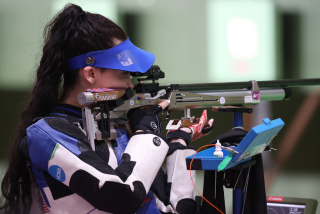U.S. Sharpshooters Aim to Protect Peacekeepers
- Share via
TUZLA, Bosnia-Herzegovina — As the number of sniper attacks against NATO-led peace forces in Bosnia rises, pressure is growing among a team of highly trained U.S. sharpshooters who spend their days perched atop buildings at the air base here, scanning the horizon for potential threats.
To hear it from 18 members of an Army Airborne scout platoon in Tuzla, they are the real snipers--not like the Bosnian “amateurs” who terrorized civilians throughout the war and now are using the international peacekeeping forces as targets.
“The word ‘sniper’ has been used here for anyone making potshots,” Sgt. Andrew Measels, 27, of Springfield, Va., one of the American “snipers,” said in a condescending tone. “We use it as a professional term.”
“It means we’re precision killers,” said Damian Mackie, 25, of Seattle, another platoon member.
In recent days, a sniper’s bullet grazed the neck of a U.S. Army officer, and in two separate incidents Tuesday evening, gunmen opened fire on British vehicles, slightly wounding a British peacekeeper.
The attacks have focused attention on the elite counter-sniper teams charged with keeping the 60,000-member North Atlantic Treaty Organization force safe from a danger that is considered second only to mines.
“Snipers and mines, they’re the two biggest threats,” said Sgt. Jeff Gurvitch, 24, of Plymouth, Mass., as he went on duty in the post that the U.S. sharpshooters have affectionately named Tuzla Towers.
To get to their positions, he and his partner--the sharpshooters work in pairs--climb metal ladders to the roof of the building that houses the water-heating equipment for the base. They spend 12 to 96 hours--the shifts vary so outsiders cannot predict the schedule--in a cramped, enclosed bunker with two electric heaters and a bunk.
On one wall, facing the main road leading to the base, is the 3-by-4-inch hole that the soldiers peer through, searching for any trouble that may be lurking behind the peaceful farmhouses or the laundry drying on a line. Nearby are a night-vision scope and binoculars, and an arm’s length away are the primary tools of their trade--their M-24 rifles.
“We have the coolest mission,” Gurvitch said.
“If we didn’t do this, we’d be out there digging ditches with the rest of the guys,” said his partner, Cpl. Bradley Wade, 26, of Arvada, Colo.
Similar posts are scattered around the air base, but their number and locations are kept secret.
Although they arrived in Bosnia-Herzegovina expecting to be busy countering sniper fire, so far none of the sharpshooters at the Tuzla air base, headquarters for the U.S. forces participating in the NATO-led mission, has had to use that skill.
But if need be, some of them said, they can hit a man at 1,200 yards.
“If they do pop their heads out, we could shoot them. We have the capability,” Gurvitch said.
Unlike local snipers--who killed hundreds of civilians during nearly four years of war here--most of the U.S. “snipers” have never actually shot another human.
Some of them say they feel like Maytag repairmen, trained for a task they will never perform.
Still, none believes that he would have any trouble finding a man in his scope and squeezing the trigger of his high-powered rifle.
“That’s why they like to choose guys who are experienced hunters,” Mackie said. “They know we’re willing to shoot at something that breathes and bleeds.”
For years, the Americans said, they have studied the activity of the Bosnian snipers from afar.
The sound of sniper fire was common in the besieged cities and on the battlefields throughout the war. From their hidden nests in shelled-out buildings, Bosnian snipers focused on passersby, sledding children or elderly people out searching for provisions. With an intimate view of their victims, they squeezed the trigger.
Scenes of civilians cut down by sniper fire on city streets were among the indelible television images of the war.
Sniper shields--metal sheeting propped up on junked buses--lined the sidewalks along Sarajevo’s “sniper alley.”
After the signing of the Balkan peace accord last month in Paris, sniper fire tapered off distinctly.
But with the approach of Saturday’s scheduled transfer of Serb-held Sarajevo suburbs to the control of the Muslim-Croat federation, sniper attacks have increased--with the NATO-led forces as the prime target.
NATO officials have not determined who is responsible.
Tuesday’s attacks on British military vehicles came only two days after an American officer was grazed by small-arms fire in the same place--Ilidza, one of the Serb-held suburbs of Sarajevo.
So far, there has been nothing but calm in Tuzla, which has surprised the American sharpshooters.
“We thought there was going to be more of a threat,” said Spc. David Powell, 26, of Los Angeles.
The sharpshooters said they are aware that they stand out from the rest of the U.S. soldiers. When they walk through Tuzla, local residents, even children, pick them out of crowds and whisper “snajper,” the Serbo-Croatian word for “sniper.”
Back at the base, they keep to themselves. While most soldiers are trained to follow orders and act as teams, these sharpshooters work for hours in an isolated spot and must make snap decisions on their own.
“The other soldiers think we have an air of elitism,” Measels said, admitting that he and the other members of the scout platoon do not talk to other soldiers. “It’s part of our mystique.”
More to Read
Sign up for Essential California
The most important California stories and recommendations in your inbox every morning.
You may occasionally receive promotional content from the Los Angeles Times.












